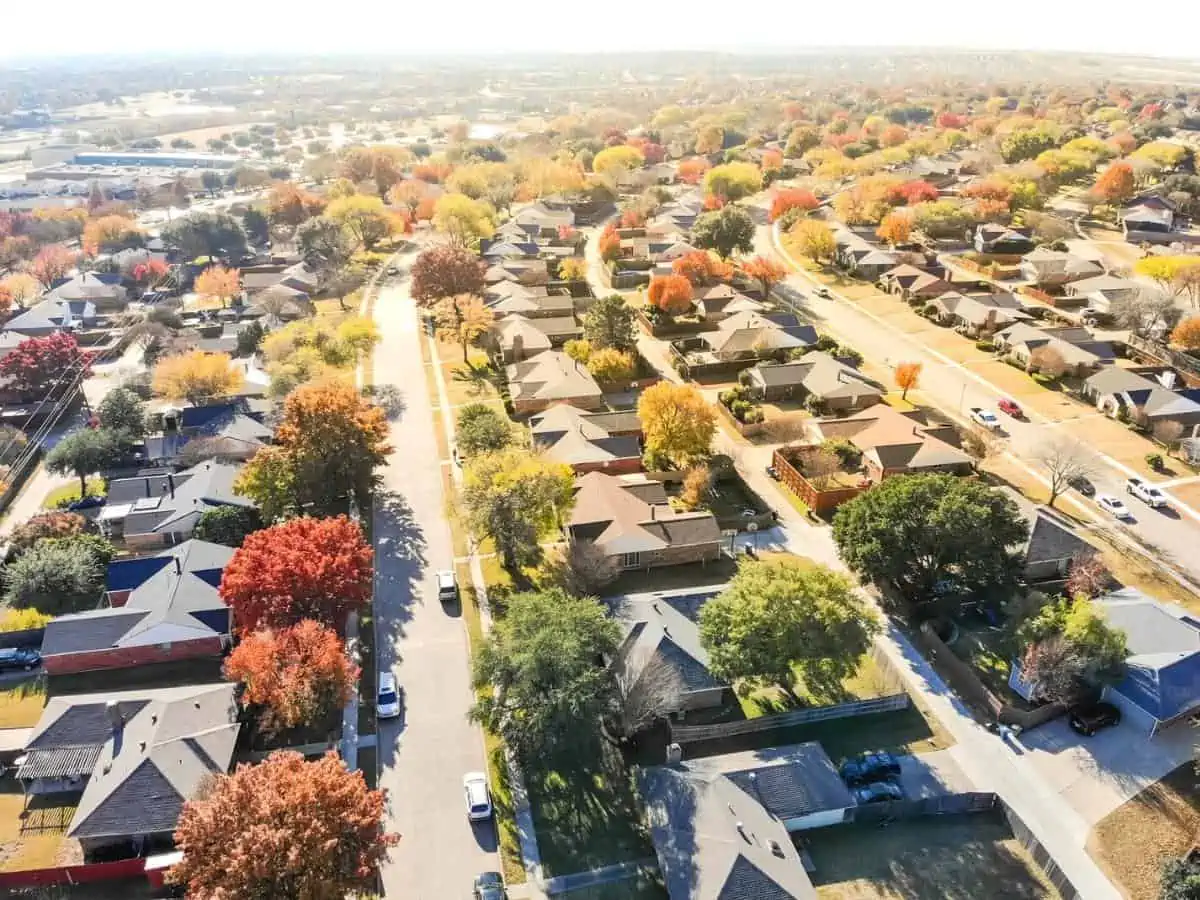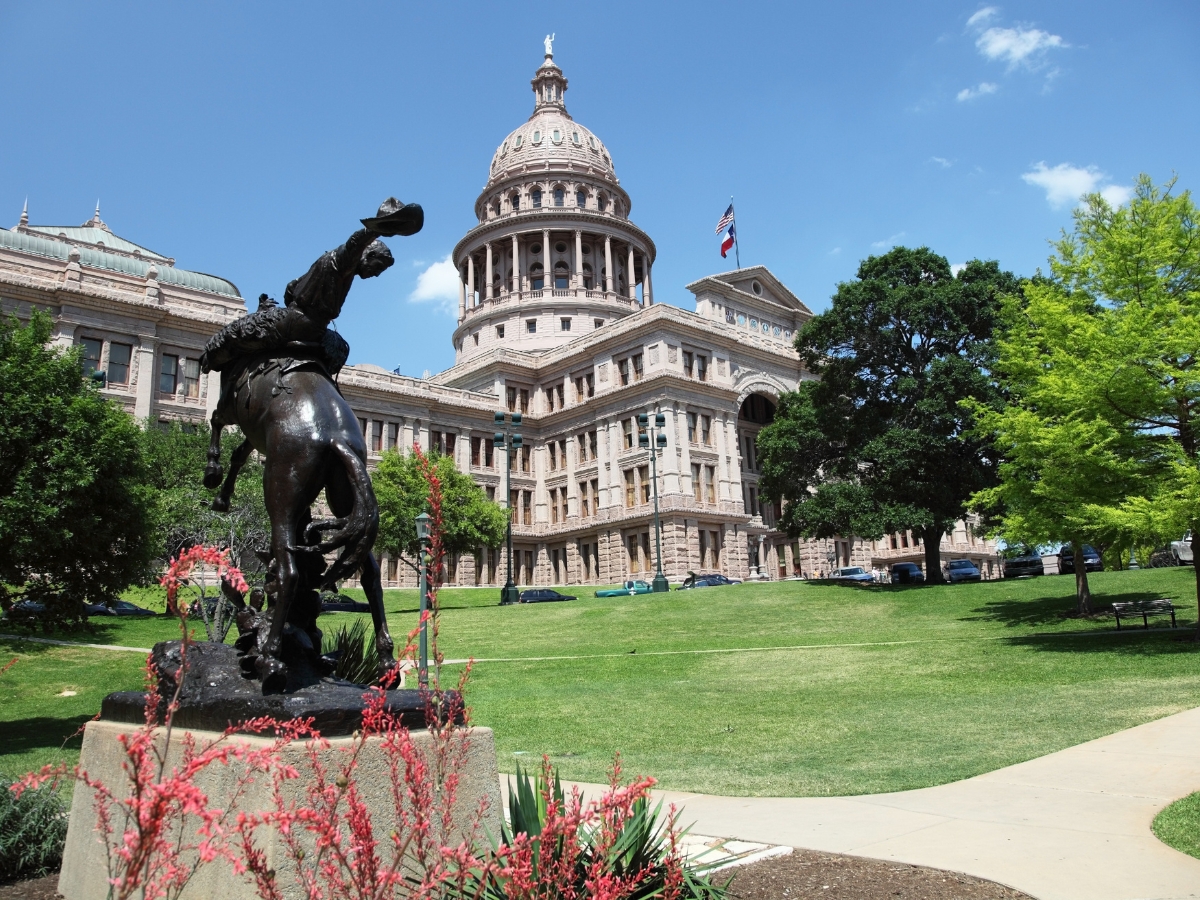The time needed to live in Texas will vary depending on the purpose. Ideally, being a resident of Texas may require living in the state for as much as 30 days, as it’s a requirement in many cases.
However, if you’re applying for a commercial driver’s license, the 30-day requirement will be waived, so you’ll need zero days to establish residency.
If you want to learn more about establishing a residency in Texas and the time requirements for every purpose, keep reading this guide!

- How Long Do You Have to Live in Texas to Be a Resident
- Step-by-Step Process for Becoming a Resident in Texas
- Process for Obtaining a Texas Voter Registration
- Registering for State Benefits in Texas
- Steps to Establish Tax Residency in Texas
- Texas Residency for College or University Admissions
- Time Requirements for Different Residency Purposes
- Next Steps for Your Residency
- Texas Residence FAQs
How Long Do You Have to Live in Texas to Be a Resident
According to the Texas Department of Safety, the time requirement for being a resident of Texas is generally 30 days. The reason is that you need to present certain documents as proof of residency to the state before being declared a resident, and one of these documents must show that you’ve been in the state for 30 days.
However, the time needed to become a resident of Texas isn’t always 30 days, as different purposes may require additional paperwork and, therefore, can take longer or shorter than 30 days.
What counts as proof of residence in Texas?
Our state is flexible regarding proof of residence, as an extensive list of documents counts as legal proof that you’re a resident here. The most popular ones are any valid registration card of any controlled belonging, such as a motor vehicle, a boat, deeds, mortgage, lease agreements, etc.
The documents must include the applicant’s name and an address in the state. Check out the Texas Department of Safety list to learn more about eligible documents. Ideally, you need two printed documents (not photocopied) from the list, where one of them verifies the 30-day requirement if required.

Step-by-Step Process for Becoming a Resident in Texas
Becoming a legal resident of Texas, commonly known as establishing domicile, involves steps demonstrating your intent to make Texas your permanent home. Here is a step-by-step guide to help you establish residency in Texas:
- Move to Texas:
- Establish a physical presence in the state. This usually involves moving your belongings and starting to live in Texas.
- Secure Housing:
- Rent or purchase a home in Texas. Having a Texas address is crucial for establishing residency.
- Update your mailing address to reflect your new Texas address.
- Obtain a Texas Driver’s License or ID:
- Visit a Texas Department of Public Safety (DPS) office.
- Bring the required documents to prove your identity and Texas residency (such as a lease agreement, utility bills, etc.).
- Surrender any out-of-state driver’s license.
- Register Your Vehicle:
- Transfer your vehicle registration to Texas at a County Tax-Assessor Collector’s office.
- Inspect your vehicle at a certified Texas Department of Public Safety inspection station.
- Provide proof of auto insurance in Texas.
- Register to Vote:
- Update your voter registration to reflect your Texas address.
- You can register to vote or register separately when you get your driver’s license.
- Employment:
- If you are moving to Texas for employment, ensure your employer updates your address and pays your income to Texas.
- If seeking employment, start your job search in Texas.
- Update Financial Accounts:
- Change the address on your bank accounts, credit cards, and other financial accounts to your Texas address.
- Consider opening an account with a Texas-based bank or credit union.
- Establish Domicile:
- Engage in activities that demonstrate your intent to reside in Texas indefinitely, like joining local clubs, getting a library card, or becoming involved in community activities.
- Tax Considerations:
- File your taxes from your Texas address. If you own property in another state, file a non-resident tax return if required.
- Maintain Records:
- Keep records of all these changes and any other actions you take to establish residency in Texas, as they may be required for various purposes like in-state tuition eligibility or legal matters.
Additional Considerations
- Timeline: It generally takes at least 12 months of living in Texas to establish residency, especially for purposes like in-state tuition.
- Intent: Actions demonstrating your plan to make Texas your permanent home are key to establishing residency.
- Continuous Presence: Try to remain in Texas for most of the year. Extended periods outside of Texas can impact your residency status.
- Legal Matters: If legal matters are pending in another state (like a divorce or lawsuit), resolve them or transfer them to Texas.
- Documentation: Keep all documentation related to your move and establishment of residency in Texas.
Establishing residency in Texas is a straightforward process, but it requires attention to detail and a commitment to integrating into the Texas community. If you are moving for specific reasons like education or tax purposes, understand any particular requirements related to those areas.
Can I be a resident of two states at the same time?
The simple answer to this question is yes. Since residency and domicile are two different things, this is legally possible. However, if you have been staying in another state for purposes like work for more than 184 days, you can be a resident of both your home and work states.
That said, whenever legally possible, you should avoid filing as a resident in two states simultaneously. Both conditions have the right to tax your income according to their income tax rules, regardless of where you earned money. In other words, you’ll be taxed twice for the same money.

Process for Obtaining a Texas Voter Registration
The process for obtaining voter registration in Texas is straightforward and involves a few key steps. Here’s a step-by-step guide to help you through the process:
Step-by-Step Guide to Texas Voter Registration
- Check Eligibility
- You must be a U.S. citizen.
- You must be a resident of the county where you apply.
- You must be at least 17 years and 10 months old and 18 years of age on Election Day.
- You must not be a convicted felon (though you may be eligible to vote if you have completed your sentence, probation, and parole).
- You must not have been declared mentally incapacitated by a court of law.
- Complete a Voter Registration Application
- Online: Download and complete the Voter Registration Application from the Texas Secretary of State’s website. Texas does not offer online voter registration, but you can complete the application online.
- In Person: Pick up an application at your local county Voter Registrar’s office, libraries, government offices, or high schools.
- Submit the Application
- Mail: Send the completed application to your county Voter Registrar. The address can be found on the application or by visiting the Texas Secretary of State’s website.
- In Person: You can also hand-deliver the completed application to your county Voter Registrar’s office.
- Wait for Your Voter Registration Certificate
- Once your registration is accepted, you will receive a Voter Registration Certificate. This can take up to 30 days.
- Check your certificate to ensure all information is correct. If there are any errors, immediately notify your county Voter Registrar.
- Know Your Voting Location
- Your voting precinct number will be on your voter registration card. You can also find your polling place by checking the Texas Secretary of State’s website.
- Keep Your Voter Registration Current
- Update your voter registration if you move or change your name.
- Bring Proper Identification to the Polls
- Texas requires voters to present an approved form of photo identification at the polling place. A list of acceptable IDs can be found on the Vote Texas website.
Important Dates
- Registration Deadline: Register to vote at least 30 days before the election date.
For more information or assistance, visit the VoteTexas.gov website or contact your local county Voter Registrar’s office. Remember that the process is designed to be accessible and straightforward, so don’t hesitate to register and exercise your right to vote.

Registering for State Benefits in Texas
Medicaid
- Eligibility Check:
- Determine your eligibility for Medicaid in Texas. Generally, this includes low-income individuals, pregnant women, children, elderly, and people with disabilities.
- Use the Texas Health and Human Services Commission’s (HHSC) online tool for preliminary eligibility determination.
- Application Process:
- Apply online at YourTexasBenefits.com, which is the official Texas HHSC website.
- Alternatively, you can apply personally at a local HHSC office or by mail.
- You must provide personal information, including income, household size, and insurance coverage.
- Documentation:
- Submit necessary documents, such as proof of income, identification, and Texas residency.
- Application Review:
- Once your application is submitted, it will be reviewed by HHSC. This process can take up to 30 days.
- Approval and Enrollment:
- You’ll receive a notification and information about your health coverage if approved.
- Using Benefits:
- Once enrolled, you can use Medicaid for approved health services.
SNAP (Food Stamps)
- Eligibility Check:
- Check if you meet the eligibility requirements, which include income and resource limits.
- Use the SNAP Benefit Estimator tool on YourTexasBenefits.com for preliminary eligibility.
- Application Process:
- Apply online at YourTexasBenefits.com.
- You can also apply personally at a local HHSC office or by mail.
- Documentation:
- Provide necessary documentation, including proof of income, expenses, and identification.
- Interview:
- After submitting your application, you may be required to attend an interview, usually by phone.
- Application Decision:
- HHSC will process your application and notify you of the decision. This typically takes about 30 days.
- Receiving Benefits:
- If approved, benefits are provided on a Lone Star Card, which works like a debit card.
Important Tips
- Update Your Information: Keep your contact information and any changes in income or household size updated to ensure continuous coverage.
- Annual Renewal: Benefits like Medicaid and SNAP require yearly renewal. You’ll receive a notice when it’s time to renew.
Contact and Resources
- Texas Health and Human Services Commission: Contact the official website for more detailed information and assistance.
- YourTexasBenefits.com: This is the primary portal for applications and information on state benefits in Texas.
- Local HHSC Office: For in-person assistance, find your nearest HHSC office.
Remember, each case is unique, and the specific requirements may vary. Always refer to the official resources for the most accurate and detailed information.

Steps to Establish Tax Residency in Texas
Becoming a tax resident in Texas involves understanding the state’s tax laws and ensuring compliance with them. Texas is known for having no state income tax, often attracting individuals seeking residency for tax purposes. Here’s a step-by-step guide to becoming a tax resident:
- Physical Presence:
- Reside in Texas for a significant part of the year. While no set number of days is defined by Texas law, spending more than half the year (over 183 days) in Texas is generally a good benchmark.
- Domicile:
- Establish a domicile in Texas. This means you have a place you consider your permanent home to which you intend to return after being away. Buying or renting a home in Texas can serve as evidence of this.
- Change of Address:
- Update your address with government and financial entities. This includes your driver’s license, voter registration, and the Internal Revenue Service (IRS).
- Driver’s License and Vehicle Registration:
- Obtain a Texas driver’s license and register your vehicles in Texas. This is a significant indicator of residency.
- Voter Registration:
- Register to vote in Texas, further establishing your civic ties to the state.
- Employment and Business Ties:
- If possible, establish employment or business connections in Texas.
- Financial Accounts:
- Consider moving your banking and financial accounts to Texas-based institutions.
- Public Records:
- Make sure that public records reflect your Texas residency. This includes records like your mailing address, utility bills, and property records if applicable.
- Professional Licenses:
- If you hold any professional licenses, transfer them to Texas.
- Social Ties:
- Joining local organizations, clubs, or community groups can also help establish your social presence in the state.
Important Considerations
- No State Income Tax: Texas does not have a state income tax, so the focus is on establishing residency rather than tax filing.
- Federal Taxes: You must still file and pay federal income taxes as required by the IRS.
- Previous State Taxes: If moving from a state with income tax, ensure you fulfill any final tax obligations in your last state. Some states may have “part-year resident” tax returns.
Establishing tax residency in Texas is primarily about proving that you have moved your primary domicile to Texas and intend to make it your permanent home. There are no specific tax forms to fill out for Texas state income tax, but ensuring all other aspects of your life reflect your Texas residency is crucial.
It’s also wise to consult with a tax professional to ensure a smooth transition, especially if you’re moving from a state with different tax laws.

Texas Residency for College or University Admissions
To establish Texas residency for college or university admissions, students typically need to meet specific criteria set by the Texas Higher Education Coordinating Board. These requirements are designed to ensure that only bona fide residents of Texas receive the benefits of in-state tuition. Here are the essential requirements:
- Domicile in Texas: Establish and maintain a domicile in Texas for 12 consecutive months before the census date of the academic semester in which you enroll. Domicile is defined as living in Texas with the intent to maintain a permanent home. This can be demonstrated through various means, such as owning property, having a full-time job in Texas, or registering to vote in Texas.
- Physical Presence: Be physically present in Texas for at least 12 consecutive months before the census date of the semester of enrollment. This requirement aims to show that you are not just in Texas for educational purposes but have established a life in the state.
- Independent or Dependent Status:
- For independent students, you must be able to provide evidence of self-support and not be claimed as a dependent on someone else’s tax return who is not a resident of Texas.
- For dependent students, the parent or court-appointed legal guardian with whom the student lives must have established a domicile in Texas and meet the above requirements.
- Intent to Reside in Texas: You should be able to demonstrate your intent to reside in Texas indefinitely. This might include obtaining a Texas driver’s license, registering to vote in Texas, and establishing Texas as your permanent address on all records.
- Financial Independence: In some cases, students must demonstrate financial independence to qualify for residency. This generally means they should not be claimed as a dependent on someone else’s tax return who is not a resident of Texas.
- Special Cases: There are exceptional circumstances where residency can be established differently, such as for military personnel and their dependents, certain visa holders, or individuals who have graduated from a Texas high school and have lived in the state for a certain period.
It’s important to note that each college or university may have additional or slightly different requirements. Therefore, checking with the specific institution’s admissions or registrar’s office for the most accurate and detailed information is advisable. Additionally, some exemptions or waivers might apply depending on your circumstances.

Time Requirements for Different Residency Purposes
As previously mentioned, the purpose of residency can impact the time requirement, so here’s a quick look at some of the popular purposes and how long you need to live in Texas for it:
Voting
Voting is interesting because you must fulfill the residency requirements and register to vote. Registering to vote doesn’t have to prove that you have lived in that area. Instead, you only need to register in the county where you plan to vote.
to become an eligible voter in Texas, you must register as a voter in the county you live in at least 30 days before an election. As a result, you must live at least 30 days in the county you’re voting in to be eligible for registration.
ID and Driver’s License
If you want to issue a Texas ID or driver’s license, you must live in the state for at least 30 days. The reason is that you’ll need to submit any two documents from the eligible list, and both must show an address in Texas.
However, some exceptions will waive the 30-day requirement, allowing you to become a resident on the same day you arrive, such as:
- If you’re obtaining a commercial driver’s license
- If you’re giving up a valid (unexpired) ID or driver’s license from another state in exchange for a Texas one.
However, even in those situations, you must submit proof of residency or complete a Texas residency affidavit form.

Next Steps for Your Residency
If you’re looking to become a resident of Texas and need specific information or assistance, several resources and contact points can be helpful. Here are some key contacts and links:
Key Contacts and Resources for Establishing Texas Residency
- Texas Department of Public Safety (DPS)
- For Driver’s License and ID Card:
- Website: Texas DPS
- Contact Page: DPS Contact
- Phone: (512) 424-2000
- For Driver’s License and ID Card:
- Texas Department of Motor Vehicles (TxDMV)
- For Vehicle Registration:
- Website: TxDMV
- Contact Form: TxDMV Contact
- Phone: (888) 368-4689
- For Vehicle Registration:
- Texas Secretary of State
- For Voter Registration:
- Website: VoteTexas.gov
- Contact Info: VoteTexas Contact
- Phone: (800) 252-VOTE (8683)
- For Voter Registration:
- Texas Comptroller of Public Accounts
- For Tax-Related Questions:
- Website: Texas Comptroller
- Contact Page: Comptroller Contact
- Phone: (800) 252-5555
- For Tax-Related Questions:
- Texas Higher Education Coordinating Board
- For In-State Tuition Queries:
- Website: THECB
- Contact Info: THECB Contact
- Phone: (512) 427-6101
- For In-State Tuition Queries:
- Local County Tax-Assessor Collector’s Office
- For Local Specific Information:
- Find Your Local Office: County Directory
- For Local Specific Information:
- Texas Real Estate Commission
- For Housing and Relocation Services:
- Website: TREC
- Contact Info: TREC Contact
- Phone: (512) 936-3000
- For Housing and Relocation Services:
- Texas Health and Human Services
- For Health-Related Residency Matters:
- Website: Texas HHS
- Contact Page: HHS Contact
- Phone: 2-1-1 or (877) 541-7905
- For Health-Related Residency Matters:
Additional Resources
- Moving to Texas Guide: A comprehensive resource for individuals relocating to Texas, covering various aspects of the move and residency. (Website: Texas.gov)
- Local Libraries and Community Centers: These can provide you with local information and resources for settling into a new community in Texas.
Remember, each of these agencies and departments has specific roles in establishing residency in Texas, and their websites offer a wealth of information that can guide you through the process.
Texas Residence FAQs
Are residence and domicile the same thing?
No, domicile is defined as your “legal address”. It’s the place where you have your permanent home and where you also pay your taxes. On the other hand, residence can be a part-time thing.
Can you establish a residency in Texas while being claimed as a dependent in another state?
An individual claimed as a dependent in a state other than Texas on a Federal tax return will be listed based on the other state. As a result, you won’t be able to establish residency here, so you must keep that in mind if you’re a student filing for Texas residency to become eligible for in-state university tuition.
Christian Linden is a seasoned writer and contributor at Texas View, specializing in topics that resonate with the Texan community. With over a decade of experience in journalism, Christian brings a wealth of knowledge in local politics, culture, and lifestyle. He holds a Bachelor's degree in Communications from the University of Texas. When he's not writing, Christian enjoys spending weekends traveling across Texas with his family, exploring everything from bustling cities to serene landscapes.











